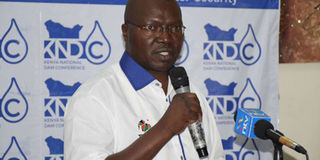Relief for locals as State okays sea water desalination plant

Water Cabinet Secretary Simon Chelugui speaks during the Kenya National Dam Conference at Flamingo Beach Hotel, Mombasa, on March 8, 2018. He has said the government is working to resolve water woes. PHOTO | WACHIRA MWANGI | NATION MEDIA GROUP
What you need to know:
- Mr Chelugui his ministry is pinning its hopes on reforms in a bid to solve water issues in the country.
- The government is undertaking a Sh3.5 billion water and sanitation development programme in Mombasa County.
The government has settled on a contractor to build the Sh650 million sea water desalination plant in Lamu County.
Water Cabinet Secretary Simon Chelugui said his Transport, Infrastructure, Housing and Urban Development counterpart James Macharia is expected to launch it very soon.
Mr Chelugui told journalists at the Coast Water Services Board offices in Mombasa on Thursday that the plant will also address the persistent water shortage that has bedevilled the coast region for decades.
“We cannot have the sea here and then go without fresh water for days whereas a technology is in place to have this water used domestically,” Mr Chelugui said.
WATER PROJECT
Desalination of sea water has taken root in European countries such as Italy where residents even move around with portable desalination containers.
Mr Chelugui, who is on a two-day tour of water projects at the coast, was accompanied by Principal Secretary Joseph Irungu, Chief Administrative Secretary Winnie Guchu, Coast Water Services Board chief executive officer Jacob Torutt and chairperson Fatuma Hirsi.
The CS further revealed that the government, in collaboration with the World Bank, is undertaking a Sh3.5 billion water and sanitation development programme in Mombasa County.
“We are improving the pipe work and water connectivity within Mombasa County. We are replacing aged pipes with new ones to stop loss of water revenue, which runs into millions of shillings every year,” the Cabinet secretary said.
REVENUE
Currently, non-revenue water loss stands at 50 per cent but, once the new piping is complete, it will reduce it to 20 per cent, he said.
“This will also stop water cartels who have been taking advantage of the old pipes to tap into our lines and sell the water to residents. We will make sure these tricks are brought to an end,” he said.
The CS said his ministry is pinning its hopes on reforms in a bid to solve water issues in the country.
“One of the reforms pointed out in the Water Act 2016 is conversion of regional water boards to regional water works and also the renaming of the national water and sewerage corporations to water storage and harvesting authorities,” Mr Chelugui said.
He added: “We are also looking at the population growth as we can no longer depend on rivers but must now find alternative ways of tapping water in the country.”





